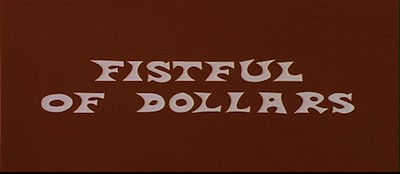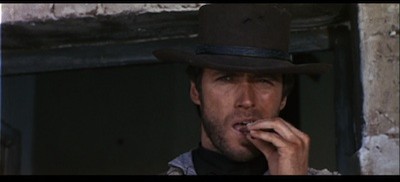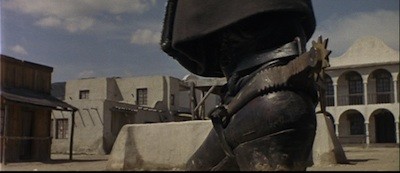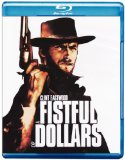| Reviews & Columns |
|
Reviews DVD TV on DVD Blu-ray 4K UHD International DVDs In Theaters Reviews by Studio Video Games Features Collector Series DVDs Easter Egg Database Interviews DVD Talk Radio Feature Articles Columns Anime Talk DVD Savant Horror DVDs The M.O.D. Squad Art House HD Talk Silent DVD
|
DVD Talk Forum |
|
|
| Resources |
|
DVD Price Search Customer Service #'s RCE Info Links |
|
Columns
|
|
|
Fistful of Dollars, A
THE MOVIE:
Please Note: The screengrabs used here are from the standard-definition DVD released in 1999, not from the Blu-Ray.

The 1964 film A Fistful of Dollars is the first of three collaborations between director Sergio Leone, musician Ennio Morricone, actor Clint Eastwood, and a host of other creative cinematic minds. Their collective efforts would become known as "The Man With No Name Trilogy," though its alternate title, "The Dollars Trilogy," more directly indicates the series starting point. Indeed, Fistful would both establish the style and tone of the films to come and start the Spaghetti Western revolution, altering forever the faltering cowboy genre.
Eastwood isn't exactly nameless in the picture. The undertaker calls him Joe, though that may just be a placeholder in lieu of a given name. The mysterious stranger wanders into a small Mexican town only to be harassed by a trio of local toughs. They work for John Baxter (Wolfgang Lukschy), the local sheriff and one of two rival houses whose feuding has all but ruined the town. The other gang is run by the Rojo brothers, a pair of ruthless gunslingers who are exactly the kind of lawless characters we would normally expect a lawman to put behind bars. Not so in this case. Ramon Rojo (Gian Maria Volonté, a.k.a. Johnny Wels) is a particularly bad customer. He massacres an entire regiment of Mexican soldiers and then frames another regiment of murdered American soldiers for the crime, all to get his hands on a couple of bags of gold. Ramon also holds the beautiful Marisol (Marianne Koch) prisoner, having won her in a card game. Her husband and son spend much of Fistful hanging around, despite warnings to get out of town.
Once Eastwood susses out the situation, he formulates a plan to use both sides to put money in his pocket. He first hires himself out to the Rojo clan, getting their attention by gunning down the men who hassled him at the start of the film, but quickly changes allegiances and sells secrets to the Baxters. He moves whichever way the wind blows, though his flexible moral boundaries are not as self-serving as they seem. With each switch, he brings both families closer to their mutual destruction.
If this plot sounds familiar, that's no accident. Sergio Leone's horse opera is an unauthorized remake of Akira Kurosawa's samurai movie Yojimbo, part of a tradition of international westerns swapping stories, approved or no. (Kurosawa borrowed from John Ford, and Hollywood has taken from both the Japanese director and Leone ever since.) While A Fistful of Dollars shares a plot and a penchant for gallows humor with Yojimbo, where Leone distinguishes himself is in his aesthetic choices and moral philosophy. Fistful has a filthy look about it. The men are sweaty and dusty. They live in a kind of hell on earth, suffering in the overbearing desert heat, seemingly free from creature comforts or the normal divisions of right and wrong. Leone's version of traditional westerns is as nihilistic as any film noir, complete with an unstoppable antihero whose selfish motives mask an unyielding code of ethics. The Man With No Name has no problem leaving bodies in the street, but those are bad guys who deserve it. He doesn't take well to people messing with his friends or seeing the common man ground under the heels of sadistic thugs with money.
It's easy to see how Clint became an icon by how brightly his star already shone back in this early part of his career. He is a mesmerizing screen presence, requiring no dialogue to demand the audience's attention. The way he carries himself automatically draws the eye, and for as inscrutable as the stranger is supposed to be, Eastwood never gives the sense that this man lacks substance. Just because he doesn't tell us anything about who he is doesn't mean there isn't a rich inner life behind that stony expression. The actor's oft-imitated scowl is actually a surprisingly versatile tool that Eastwood puts to full use in Fistful. His eyes are far more expressive than the parodies would have you believe, he only squints when it means something to squint. Otherwise, you can follow his expressions and reactions and pick up everything you need to know.
Leone was smart to recognize this, and though his extreme close-ups aren't yet as pronounced as they would eventually become, he does stay tight on his performers when it's most beneficial. In fact, it's interesting to note that in this early entry, the scope is not quite as large as its sequels (the action, for instance, is restricted to the single town, and the running time is the shortest of the trio, not even getting close to two hours). This means that as the breadth of the pictures expanded, the visual style paradoxically contracted. The more Leone showed us of the big bad world, the more he tightened the lens on his big bad men. Likewise, though Morricone's music already provides sardonic commentary to the action, his work would only get more devilish from here.
Which isn't to knock A Fistful of Dollars at all. Whether one considers the action movie as the beginning of the larger work or examines it on its own, it's a cracking shoot 'em up, unique in its delivery and constructed to work in ways that are both subtle and exhilarating. It has an intangible magic that extends beyond its obvious visceral pleasures. It's the kind of movie that casts a spell regardless of how many times you have seen it, commanding your interest to such a degree that it makes you forget what you know about the narrative and just go along, eager for each new shoot-out and to see who is left standing once all the bodies are counted.

THE BLU-RAY
Video:
MGM releases A Fistful of Dollars as a single disc with a 2.35:1 high definition image. From all evidence, this is the same Blu-Ray that was part of the 2010 Man With No Name set, just now available for purchase on its own, so anyone looking for a newer restoration won't be finding it here. The picture is not nearly as sparkly as we've been spoiled to receive with other older films, but one should keep in mind that Fistful was not a big budget studio effort, but an under-the-radar foreign affair. The colors may not pop in the same way and some of the smaller details may not be as evident as nitpickers might demand, but that doesn't matter. Fistful of Dollars comes to us from a gritty cinematic frontier, and its grimy image suitably reflects that.
Even so, the transfer looks pretty great, without much in terms of damage or noise, and no noticeable edge enhancement. The surface grain looks nice, giving the disc a filmic look, and it's clear that every effort was made to get the movie looking as good as possible while honoring Sergio Leone and joint cinematographers Massimo Dallamano (a.k.a. Jack Dalmas) and Fredrico G. Larrava's initial intentions.
Sound:
The primitive mono soundtrack, complete with goofy overdubbing, is upgraded to a 5.1 DTS-HD Master Audio, and while this could have been an example of trying to make silk out of sow's ear, the finished mix is actually pretty good. There aren't a lot of subtle effects, but the balance between the various elements works nicely and the music and dialogue comes through clear. A mono version is also provided for purists, as well a stereo mix of the Spanish mono track and a French dub in 5.1.
Subtitles in all three languages are also on the disc, with the English option being geared for the deaf and hearing impaired.
Extras:
Bonus features are abundant on A Fistful of Dollars, though again, these are features that were available on last year's boxed set, and indeed, even date back to the 2007 editions of the DVD. For those keeping track, they are as follows (and most are in standard definition unless otherwise indicated):
* Christopher Frayling Archives/Full-length commentary: Frayling is an expert on Spaghetti Westerns, having literally written a book on the subject and also written a biography of Sergio Leone. In addition to his super informative, fact-filled audio commentary, he has put together a 19-minute documentary (presented in 1080p) showing off his collection of Fistful collectibles.
* "A New Kind of Hero" (23 minutes): Examining the connection to Kurosawa and the ways in which Leone went in his own direction with the material.
* " A Few Weeks in Spain: Clint Eastwood on the Experience of Making the Film" (8 minutes, 30 seconds): A 2003 interview with Eastwood about the movie.
* "Tre Voci: Fistful of Dollars (11 mins): Producer Alberto Grimaldi, screenwriter Sergio Donati, and actor Mickey Knox, who worked regularly in Italy, are interviewed about Sergio Leone and his westerns.
* "Not Ready for Primetime: Renowned Filmmaker Monte Hellman Discusses the Television Broadcast of A Fistful of Dollars" (6 mins, 20 seconds) / "The Network Prologue" (7 mins. 45 seconds): Hellman details why American television networks demanded that Fistful be shown with a prologue, and that same prologue is included, notably featuring Harry Dean Stanton as a lawman sending Eastwood to Mexico to take care of business, thus "justifying" all the violence that lay ahead.
* "Location Comparisons: Then to Now" (5 mins, 20 seconds): Current photos juxtaposed with film clips.
* Radio Spots
* Trailers
FINAL THOUGHTS:
Highly Recommended. The iconic initial pairing of Sergio Leone and Clint Eastwood, A Fistful of Dollars is a stylishly violent, philosophically challenging gateway into the modern western. The iconic Man With No Name takes on sadistic bad guys and exacts his own brand of harsh justice despite his otherwise selfish impulses. Eastwood is great as the cheroot-chewing antihero, and the whole cinematic tapestry that Leone creates has often been imitated but no one can ever do it quite like the maestro did it. The Blu-Ray presentation is excellent, with a quality transfer and lots of extensive extras. If you're just clutching to previous DVDs, this is totally worth the double-dip.

Jamie S. Rich is a novelist and comic book writer. He is best known for his collaborations with Joelle Jones, including the hardboiled crime comic book You Have Killed Me, the challenging romance 12 Reasons Why I Love Her, and the 2007 prose novel Have You Seen the Horizon Lately?, for which Jones did the cover. All three were published by Oni Press. His most recent projects include the futuristic romance A Boy and a Girl with Natalie Nourigat; Archer Coe and the Thousand Natural Shocks, a loopy crime tale drawn by Dan Christensen; and the horror miniseries Madame Frankenstein, a collaboration with Megan Levens. Follow Rich's blog at Confessions123.com.
|
| Popular Reviews |
| Sponsored Links |
|
|
| Sponsored Links |
|
|
| Release List | Reviews | Shop | Newsletter | Forum | DVD Giveaways | Blu-Ray | Advertise |
|
Copyright 2024 DVDTalk.com All Rights Reserved. Legal Info, Privacy Policy, Terms of Use,
Manage Preferences,
Your Privacy Choices | |||||||














